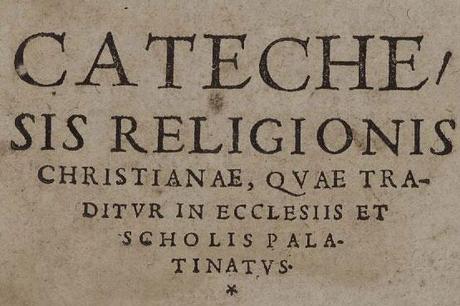Grace Thoughts
Why Learn a Christian Catechism? (Part Five)

Credit: schloss-heidelberg.de
" data-orig-size="554,369" sizes="(max-width: 554px) 100vw, 554px" data-image-title="17_heidelberg_sonstige_Titelblatt-HD-Katechismus_foto-Johannes-A-Lasco-Bibliothek-Emden_ausschnitt_presenter" class="attachment-rowling-post-image size-rowling-post-image wp-post-image" data-orig-file="https://gracelifethoughts.files.wordpress.com/2022/11/17_heidelberg_sonstige_titelblatt-hd-katechismus_foto-johannes-a-lasco-bibliothek-emden_ausschnitt_presenter.jpg" data-image-description="Credit: schloss-heidelberg.de
" height="369" width="554" data-medium-file="https://gracelifethoughts.files.wordpress.com/2022/11/17_heidelberg_sonstige_titelblatt-hd-katechismus_foto-johannes-a-lasco-bibliothek-emden_ausschnitt_presenter.jpg?w=300" data-permalink="https://gracelifethoughts.com/17_heidelberg_sonstige_titelblatt-hd-katechismus_foto-johannes-a-lasco-bibliothek-emden_ausschnitt_presenter/" alt="Credit: schloss-heidelberg.de" decoding="async" srcset="https://gracelifethoughts.files.wordpress.com/2022/11/17_heidelberg_sonstige_titelblatt-hd-katechismus_foto-johannes-a-lasco-bibliothek-emden_ausschnitt_presenter.jpg 554w, https://gracelifethoughts.files.wordpress.com/2022/11/17_heidelberg_sonstige_titelblatt-hd-katechismus_foto-johannes-a-lasco-bibliothek-emden_ausschnitt_presenter.jpg?w=150 150w, https://gracelifethoughts.files.wordpress.com/2022/11/17_heidelberg_sonstige_titelblatt-hd-katechismus_foto-johannes-a-lasco-bibliothek-emden_ausschnitt_presenter.jpg?w=300 300w" data-image-meta="{"aperture":"0","credit":"","camera":"","caption":"","created_timestamp":"0","copyright":"","focal_length":"0","iso":"0","shutter_speed":"0","title":"","orientation":"0"}" data-large-file="https://gracelifethoughts.files.wordpress.com/2022/11/17_heidelberg_sonstige_titelblatt-hd-katechismus_foto-johannes-a-lasco-bibliothek-emden_ausschnitt_presenter.jpg?w=554" />Credit: schloss-heidelberg.de
Why should parents consider teaching their children a Christian catechism? Catechisms were designed to instruct people in the basics of Christianity. Unfortunately, the majority of young people from Christian families and churches know little about the basics of the Christian faith. That’s based on numerous surveys done during the past 20 years to gauge the knowledge of young people who identify as Christians.
The fastest growing group of young people in the United States identifies as “none,” meaning they do not affiliate with any religion.
About a third of U.S. teens (32%) say they are religiously unaffiliated, including 6% who describe themselves as atheists, 4% who are agnostics and 23% who say their religion is “nothing in particular.” Pew Research
The United States is going through a “secularizing shift,” meaning that less people identify as religious (of any kind) and more people identify as religiously unaffiliated. Young people are leading the way in this dramatic change. Hundreds of thousands of teenagers and young adults are deconstructing and deconverting every year. It will not be long before Christianity will be a minority religion in America.
Those all appear good reasons for Christian parents to search for alternatives to the type of instruction their children are receiving at church and at home. If you have not read previous parts of this series, we invite you to start with the Introduction and work your way through those catechisms we’ve looked at so far.
The Heidelberg Catechism
Our next catechism is known as The Heidelberg Catechism. It was written in Heidelberg, Germany in 1563. This was about 34 years after Martin Luther’s Catechism, and 26 years after Calvin’s Geneva Catechism.
The Heidelberg Catechism has 129 questions and answers designed to be used over a period of 52 Sundays. The topics covered include:
- Our Sin and Misery
- Our Deliverance
- Our Thankfulness
Here are some examples from The Heidelberg Catechism for your consideration.
LORD’S DAY 1
Q. What is your only comfort in life and death?
A. That I am not my own, but belong with body and soul, both in life and in death, to my faithful Saviour Jesus Christ.3 He has fully paid for all my sins with his precious blood, and has set me free from all the power of the devil. He also preserves me in such a way that without the will of my heavenly Father not a hair can fall from my head; indeed, all things must work together for my salvation. Therefore, by his Holy Spirit he also assures me of eternal life and makes me heartily willing and ready from now on to live for him.10
1 Cor 6:19, 20; Rom 14:7-9; 1 Cor 3:23; Tit 2:14
LORD’S DAY 2
Q. From where do you know your sins and misery?
A. From the law of God.
Rom 3:20; 7:7-25
Q. What does God’s law require of us?
A. Christ teaches us this in a summary in Matthew 22:
Love the Lord your God with all your heart and with all your soul and with all your mind. This is the first and greatest commandment. And the second is like it: Love your neighbor as yourself. All the Law and the Prophets hang on these two commandments.
Deut 6:5; Lev 19:18.
Q. Can you keep all this perfectly?
A. No,1 I am inclined by nature to hate God and my neighbor.
Rom 3:10, 23; 1 Jn 1:8, 10; Gen 6:5; 8:21; Jer 17:9; Rom 7:23; 8:7; Eph 2:3; Tit 3:3
LORD’S DAY 5
Q. According to God’s righteous judgment we deserve punishment both now and in eternity: how then can we escape this punishment and return to God’s favor?
A. God requires that his justice be satisfied. Therefore the claims of this justice must be paid in full, either by ourselves or by another.
Ex. 23:7; Rom. 2:1-11; Isa. 53:11; Rom. 8:3-4
Q. Can we make this payment ourselves?
A. Certainly not. Actually, we increase our debt every day.
Matt. 6:12; Rom. 2:4-5
LORD’S DAY 6
Q. Why must the mediator be a true and righteous human?
A. God’s justice demands that human nature, which has sinned, must pay for sin;but a sinful human could never pay for others.
1 Rom. 5:12, 15; 1 Cor. 15:21; Heb. 2:14-16 2 Heb. 7:26-27; 1 Pet. 3:18
Q. Then who is this mediator— true God and at the same time a true and righteous human?
A. Our Lord Jesus Christ, who was given to us to completely deliver us and make us right with God.
1 Matt. 1:21-23; Luke 2:11; 1 Tim. 2:5 2 1 Cor. 1:30
LORD’S DAY 16
Q. Why did Christ have to suffer death?
A. Because God’s justice and truth require it: nothing else could pay for our sins except the death of the Son of God.
Gen. 2:17; Rom. 8:3-4; Phil. 2:8; Heb. 2:9
LORD’S DAY 29
Q. Do the bread and wine become the real body and blood of Christ?
A. No. Just as the water of baptism is not changed into Christ’s blood and does not itself wash away sins but is simply a divine sign and assurance of these things, so too the holy bread of the Lord’s Supper does not become the actual body of Christ, even though it is called the body of Christ in keeping with the nature and language of sacraments.
Eph. 5:26; Tit. 3:5; Matt. 26:26-29; 1 Cor. 10:16-17; 11:26-28; Gen. 17:10-11; Ex. 12:11, 13; 1 Cor. 10:1-4
LORD’S DAY 34
Q. What does the Lord require in the first commandment?
A. That I, not wanting to endanger my own salvation, avoid and shun all idolatry,1 sorcery, superstitious rites, and prayer to saints or to other creatures. That I rightly know the only true God, trust him alone, and look to God for every good thing humbly and patiently, and love, fear, and honor God with all my heart. In short, that I give up anything rather than go against God’s will in any way.
1 Cor. 6:9-10; 10:5-14; 1 John 5:21; Lev. 19:31; Deut. 18:9-12; Matt. 4:10; Rev. 19:10; 22:8-9; John 17:3; Jer. 17:5, 7; Ps. 104:27-28; James 1:17; 1 Pet. 5:5-6; Col. 1:11; Heb. 10:36; Matt. 22:37 (Deut. 6:5); Prov. 9:10; 1 Pet. 1:17; Matt. 4:10 (Deut. 6:13) 12 Matt. 5:29-30; 10:37-39
LORD’S DAY 45
Q. Why do Christians need to pray?
A. Because prayer is the most important part of the thankfulness God requires of us. And also because God gives his grace and Holy Spirit only to those who pray continually and groan inwardly, asking God for these gifts and thanking God for them.
Ps. 50:14-15; 116:12-19; 1 Thess. 5:16-18 2 Matt. 7:7-8; Luke 11:9-13
LORD’S DAY 52
Q. What does your conclusion to this prayer mean?
A. “For the kingdom and the power and the glory are yours forever” means: We have made all these petitions of you because, as our all-powerful king, you are both willing and able to give us all that is good; and because your holy name, and not we ourselves,
should receive all the praise, forever.
1 Rom. 10:11-13; 2 Pet. 2:9 2 Ps. 115:1; John 14:13
You can read the entire Heidelberg Catechism here and here.
Free eBook
You can download, read, and share the first five parts of our special series.
Next Time
We’ll look at The Westminster Catechism in the next part of our series.
Scripture taken from the New King James Version®. Copyright © 1982 by Thomas Nelson. Used by permission. All rights reserved.
GraceLife © 1990-2024
 Bible StudyCatechismChristianityHeidelberg CatechismJesus Christ
Bible StudyCatechismChristianityHeidelberg CatechismJesus Christ

Published by gracelifethoughts
Founder & Director of GraceLife Ministries View all posts by gracelifethoughts
